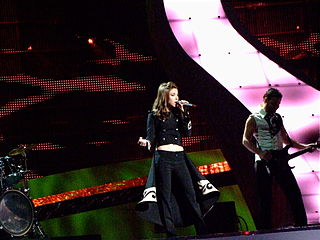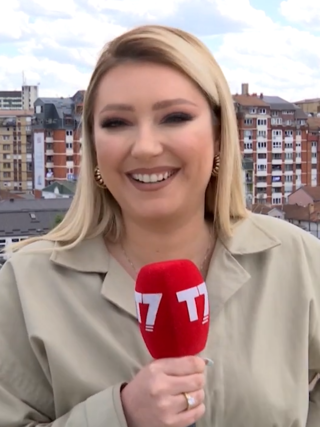Related Research Articles

Anjeza Shahini is an Albanian singer. She is best known for being the first representative of Albania at the Eurovision Song Contest in 2004, after winning the 42nd edition of Festivali i Këngës.
Festivali i Këngës në RTSH, commonly known as Festivali i Këngës and also referred to as simply FiK or Fest, is an annual music competition in Albania organised by the national broadcaster Radio Televizioni Shqiptar (RTSH). Broadcast every year since its inauguration in 1962, the festival has determined the country's representative to the Eurovision Song Contest since 2004.
Elsa Lila is an Albanian singer.

Olta Boka is an Albanian singer. She represented Albania in the Eurovision Song Contest 2008 with the song "Zemrën e lamë peng", after winning Festivali i Këngës 46.
Vaçe Zela was an Albanian singer and songwriter. She was a leading figure in the music industry and is considered one of the most influential musicians of the 20th century in Albania, Kosovo and North Macedonia.
Avni Mula was an Albanian singer and composer. For his contribution to the arts, he received two of the highest awards from the Albanian government: the People's Artist of Albania decoration and the Honor of the Nation decoration.

Kejsi Tola is an Albanian singer and songwriter. After winning the 47th edition of Festivali i Këngës, she represented Albania at the Eurovision Song Contest 2009.

Rosela Gjylbegu is an Albanian singer who won Kënga Magjike in 2009.

Aurela Gaçe is an Albanian singer and songwriter. She is a three-time Festivali i Këngës winner, a three-time Kënga Magjike winner and a two-time Balkan Music Award winner for Balkan's Song of the Year and Best Singer from Albania. She was a judge on the third season of The Voice of Albania.
Sonja "Soni" Malaj, also known mononymously as Soni, is an Albanian singer, songwriter and dancer.

Elvana Gjata is an Albanian singer-songwriter, actress and entrepreneur. Born and raised in Tirana, she has been referred to as a "Diva of Albanian music". She rose to recognition in Albania and other Albanian-speaking territories in the Balkans following the release of her two studio albums, Mamës (2007) and Afër dhe larg (2011). The singer saw further success through many acclaimed singles, as well as her extended plays 3 (2018) and Çelu (2021), and has achieved multiple number one singles in the Albanian singles chart. Gjata has also received numerous awards and accolades, including two Balkan Music Awards, a Festivali i Këngës Award, four Kënga Magjike Awards and a Top Fest Award.

Hersjana Matmuja, also known as Hersi Matmuja or simply Hersi, is an Albanian singer and songwriter. After winning the 52nd edition of Festivali i Këngës, she represented Albania in the Eurovision Song Contest 2014.

Elhaida Dani is an Albanian singer, songwriter, composer and actress. Born and raised in Shkodër, Dani performed in diverse singing competitions and started to play piano as a child. She rose to national recognition in the Albanian-speaking Balkans, after her victories at Star Academy Albania, Top Fest and Festivali i Këngës. In Italy, she is also prominent for being the winner of the first series of The Voice of Italy. Dani represented Albania in the Eurovision Song Contest 2015 with the song "I'm Alive", after she won the 53rd edition of Festivali i Këngës. She participated in Kënga Magjike for the first time in 2017 with the song "E Ngrirë" whereas she finished second. She rose again great popularity in Italy as well as in France upon her international acting debut in the world renowned musical of Notre-Dame de Paris.
Rezarta Smaja is an Albanian singer.

Marie Kraja or Marie Paluca was an Albanian opera singer who is particularly known for her delivery of Albanian folk songs.

Eneda Tarifa is an Albanian singer, actress and television host. She represented Albania in the Eurovision Song Contest 2016, after winning the 54th edition of Festivali i Këngës.

Jonida Maliqi is an Albanian singer and media personality.

Ronela Hajati, also known mononymously as Ronela, is an Albanian singer, songwriter and dancer. Born and raised in Tirana, she began performing in various singing and dancing competitions as a child before pursuing a career in music. Hajati is noted for her versatility in music, style and interpretation. After winning the 60th edition of Festivali i Këngës in 2021, she was designated as Albania's representative for the Eurovision Song Contest 2022.
Rozana Radi is an Albanian singer-songwriter and actress. Radi emerged as the winner of the 18th edition of Kënga Magjike in 2016.
Anxhela Peristeri is an Albanian singer and songwriter. She emerged as the winner of the 19th edition of Kënga Magjike in 2017. After winning the 59th edition of Festivali i Këngës in 2020, Peristeri was designated as the Albanian representative at the Eurovision Song Contest 2021.
References
- 1 2 Enver Hoxha (1979), Çështje të revolucionit dhe të ndërtimit socialist: 1971-1978, Tirana: Shtëpia Botuese "8 Nentori", p. 228, OCLC 255068616
- 1 2 3 Elizabeta Ilnica (2015-10-30), Deklarata e fortë e Sherif Merdanit: Alida Hiskun e spiunoi burri [The robust declaration of Sherif Merdani: Alida Hisku was spied by her own husband] (in Albanian), Gazeta Panorama
- 1 2 Blerina Goce (2006-04-17), "Speciale", Ditari qe me largoi nga skena [The diary that separated me from the scene](PDF) (in Albanian), Tirana Observer, archived from the original (PDF) on 2007-07-09
- ↑ Muzika Shqiptare - Këngëtarja Alida Hisku i rikthehet këngës e skenës pas 2 dekadash [The singer Alida Hisku returns to singing after two decades (in Albanian)
- ↑ Alida Hisku: Më dënuan se shkruajta në ditar, "këtu në Shqipëri ha pula gurë" [Alida Hisku: I was condemned for writing in my diary: Heere in Albania the chicken eat only rocks] (in Albanian), Gazeta Telegraf, 2013-02-18